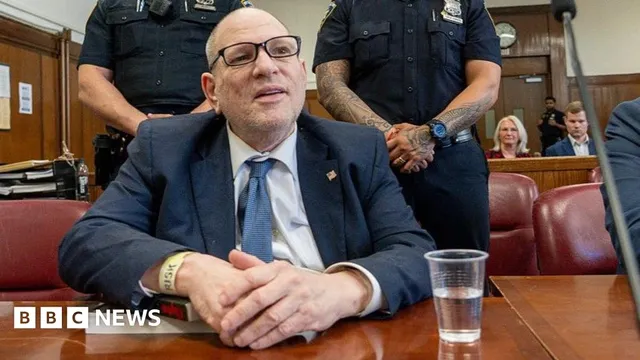
Harvey Weinstein faces new trial after court overturns previous conviction
2025-04-24 18:41- A jury consisting of seven women and five men has been selected for Harvey Weinstein's retrial, reflecting a shift in representation compared to his previous trial.
- The retrial will focus on multiple accusations of rape and sexual assault, including incidents dating back to 2006 and 2013.
- The outcome of this trial could profoundly influence discussions around sexual misconduct accountability in the entertainment industry.
Express your sentiment!
Insights
In the United States, Harvey Weinstein's rape retrial is currently underway following a significant court ruling last year that overturned his original 2020 conviction for sexual assault. The retrial commenced amidst a changing cultural landscape, emphasizing the #MeToo movement's ongoing relevance and the legal complexities surrounding high-profile cases. A jury composed of seven women and five men was selected to deliberate on accusations against Weinstein, including allegations from three women of sexual misconduct involving incidents from 2006 and 2013. The trial's location is the same Manhattan courthouse where Weinstein faced his first trial five years prior, shortly after which the #MeToo movement gained considerable traction, fueled by numerous allegations against prominent figures in Hollywood. The new jury selection exhibited a shift towards a more female panel compared to the initial group that convicted him, which included five women and seven men. Prosecutors are now addressing additional allegations that were not present during the first trial, reflecting the evolving dynamics of public opinion and legal standards in sexual misconduct cases. The result of this trial will have profound implications for Weinstein, the #MeToo movement, and the broader conversation surrounding accountability for sexual predators in the entertainment industry. As opening statements are set to begin, the stakes are high for both the prosecution and defense, further underscoring the complexities of balancing justice within the evolving societal frameworks concerning sexual abuse and assault.
Contexts
The #MeToo movement has significantly influenced legal proceedings regarding sexual harassment and assault cases in recent years. Originating in 2006 and gaining remarkable momentum in late 2017, the movement has encouraged a public reckoning with sexual misconduct, prompting more individuals to come forward with their experiences. This cultural shift has extended into the legal arena, where an increasing number of victims have pursued legal actions against their perpetrators. As a result, many jurisdictions have begun to scrutinize existing laws and procedures, implementing reforms aimed at creating a more victim-centered approach in the legal system. Key changes include the expansion of statutes of limitations, more accessible reporting processes, and enhanced support for victims throughout the legal proceedings. Legal practitioners are becoming more aware of the trauma that survivors endure, and this understanding is reflected in their approaches to handling cases of sexual misconduct. The importance of evidentiary standards has also been re-evaluated, with courts becoming more open to considering various forms of evidence, such as social media posts, text messages, and witness testimonies from other victims. Furthermore, the effects of public discourse surrounding the #MeToo movement have led to a more critical view of systemic barriers that have previously silenced victims within legal frameworks. For many survivors, sharing their stories has empowered them to seek justice, resulting in a notable increase in civil suits and a willingness to report incidents to law enforcement. The repercussions of the #MeToo movement on legal systems extend beyond individual cases. It has prompted discussions about institutional accountability, particularly within workplaces, educational institutions, and other environments where power dynamics can lead to exploitation. Many organizations are reevaluating their policies and practices in light of this increased scrutiny, aiming to foster safer environments and prevent harassment. As a consequence, legal ethics discussions surrounding confidentiality agreements, often referred to as non-disclosure agreements (NDAs), are becoming more prevalent. Advocacy groups are pushing for reforms that limit the use of NDAs in sexual harassment cases to ensure that victims are not coerced into silence, allowing systemic justice to take precedence over individual settlements. Looking forward, the trajectory of the #MeToo movement suggests lasting effects on legal proceedings related to sexual harassment and assault. While some changes have already been enacted, ongoing advocacy and societal awareness are likely to induce further reforms. Legal scholars and practitioners are tasked with navigating the evolving landscape, balancing the rights of defendants with the imperative to support and protect victims. The ultimate goal remains to establish a legal environment that not only addresses past injustices but also prevents future occurrences of sexual misconduct, promoting both accountability and cultural change. While the journey towards achieving these goals is complex and challenging, the transformative impact of the #MeToo movement on legal proceedings has undeniably paved the way for significant progress.